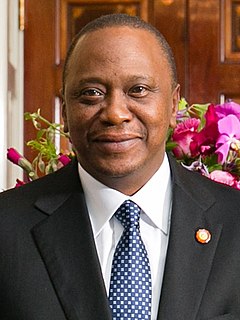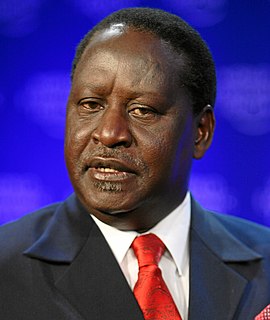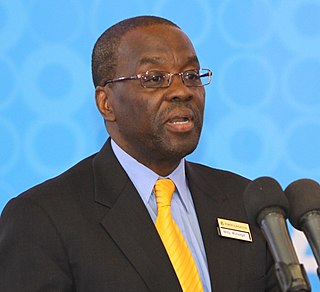
The politics of Kenya take place in a framework of a presidential representative democratic republic, whereby the President of Kenya is both head of state and head of government, and of a multi-party system in accordance with a new constitution passed in 2010.

Uhuru Muigai Kenyatta is a Kenyan politician and businessman who is the fourth and current President of the Republic of Kenya. He served as the Member of Parliament (MP) for Gatundu South from 2002 to 2013. Currently the party leader and a member of the Jubilee Party of Kenya, he was previously involved with The National Alliance and before that the Kenya African National Union.

Stephen Kalonzo Musyoka is a Kenyan politician who was the tenth Vice-President of Kenya from 2008 to 2013. Musyoka served in the government under President Daniel arap Moi and was Minister for Foreign Affairs from 1993 until 1998; subsequently, under President Mwai Kibaki, he was Minister of Foreign Affairs again from 2003 to 2004, then Minister of the Environment from 2004 to 2005. He was an unsuccessful candidate in the 2007 presidential election, after which he was appointed as Vice-President by Kibaki in January 2008.
The Liberal Democratic Party was a political party in Kenya.

Elections in Kenya take place within the framework of a multi-party democracy and a presidential system. The President, Senate and National Assembly are directly elected by voters, with elections organised by the Independent Electoral and Boundaries Commission (IEBC).
Chirau Ali Mwakwere is a Kenyan politician and diplomat. He served as the Foreign Minister of Kenya from June 2004 to December 2005, and then became transport minister in December 2005, when serious problems within the National Rainbow Coalition caused a cabinet reshuffle. As a young man he became well-educated and entered government service in 1967, serving as an ambassador to several countries and also in several domestic positions, including education. He was a member of the Kenya African National Union until 2002, rising to the rank of deputy leader, but he left to join the new opposition National Rainbow Coalition which won the 2002 elections. He is a Muslim and enjoys playing golf.

William Kipchirchir Samoei Arap Ruto is a Kenyan politician who has been Deputy President of Kenya since 2013. He served as the Acting President of Kenya between 5 and 8 October 2014 while President Uhuru Kenyatta was away at the Hague.He previously served in various ministerial positions including the Ministry of Home Affairs, the Ministry of Agriculture and the Ministry of Higher Education Science and Technology. He was Secretary General of KANU, the former ruling political party, and MP for Eldoret North Constituency between December 1997 and January 2013. He won the seat in the 1997 Kenyan election after defeating Reuben Chesire. He was appointed to the position of Assistant Minister in the Office of the President by President Daniel arap Moi in 1998. He was promoted to be Minister for Home Affairs in August 2002. He also previously served as the Chairman of the Parliamentary Select Committee on Constitutional Reform in the 9th Parliament.

Raila Amolo Odinga is a Kenyan politician who served as Prime Minister of Kenya from 2008 to 2013, and has served as Leader of the Opposition since 2013. He was Member of Parliament (MP) for Langata from 1992 to 2013. He served in the Cabinet of Kenya as Minister of Energy from 2001 to 2002, and as Minister of Roads, Public Works and Housing from 2003 to 2005. Odinga was appointed High Representative for Infrastructure Development at the African Union Commission in 2018.

George Musengi Saitoti, E.G.H. was a Kenyan politician, businessman and American- and British-trained economist, mathematician and development policy thinker.

General elections were held in Kenya on 27 December 2007, electing the President, National Assembly and local councils.

General elections were held in Kenya on 29 December 1992, the first multi-party elections since independence. The results were marred by allegations of ballot-box stuffing, and targeted ethnic violence in the Rift Valley Province. Human Rights Watch accused several prominent Kenyan politicians, including President Daniel arap Moi and then-VP George Saitoti of inciting and co-ordinating the violence. They were also the first elections to feature a ballot for the post of President, who had, in 1964, been elected by the National Assembly, and, following a 1969 constitutional amendment, been automatically declared winner of non-held popular elections, held alongside parliamentary elections, in 1969, 1974, 1979, 1983, and 1988. Voter turnout was 69.4%.

The Government of the Republic of Kenya (GoK) is the national government of the republic of Kenya which is composed of 47 Counties, each county with its own semi-autonomous governments. The national government is composed of three arms: the legislature, the executive and the judiciary. Each arm is independent of the other and their individual roles are set by the Constitution of Kenya. The full name of the country is the "Republic of Kenya". Its official Swahili name is 'Jamhuri ya Kenya'. Other terms such as GoK, GK and Serikali are popularly used to refer to the Kenyan government.

Willy Munyoki Mutunga is a Kenyan lawyer, intellectual, reform activist, and the Commonwealth Special Envoy to the Maldives. He is also an active member of the Justice Leadership Group. He is the retired Chief Justice of Kenya and President of the Supreme Court of Kenya.
The inauguration of Uhuru Kenyatta took place 9 April 2013. Kenyatta won 50.07% of the vote in the 2013 presidential election.
The Raila Doctrine simply states .....a presidential election, which is not free and fair, should never be acceptable in a democratic country. It was coined if reference to Raila Odinga reacting to his losses in elections in Kenya, which he has termed as fraudulent. The phrase was coined in a legal argument by Senior Counsel Ahmednasir Abdullahi representing the IEBC during the Kenyan Presidential elections petition that was heard by the Supreme Court of Kenya in March 2013. The doctrine simply states .....a presidential election, which is not free and fair, should never be acceptable in a democratic country.

The presidency of Daniel arap Moi began on August 22, 1978, when Daniel arap Moi was sworn in as the 2nd President of Kenya, and ended on December 30, 2002. Moi, a KANU party member, took office following the death of the then president Jomo Kenyatta on the same day. He was sworn as interim president for 90 days during which the country was to prepare for a presidential election to be held on 8 November. Moi won reelections in 1988, 1992 and 1997, defeating Mwai Kibaki in the latter two elections. He was succeeded by Mwai Kibaki in 2002.














